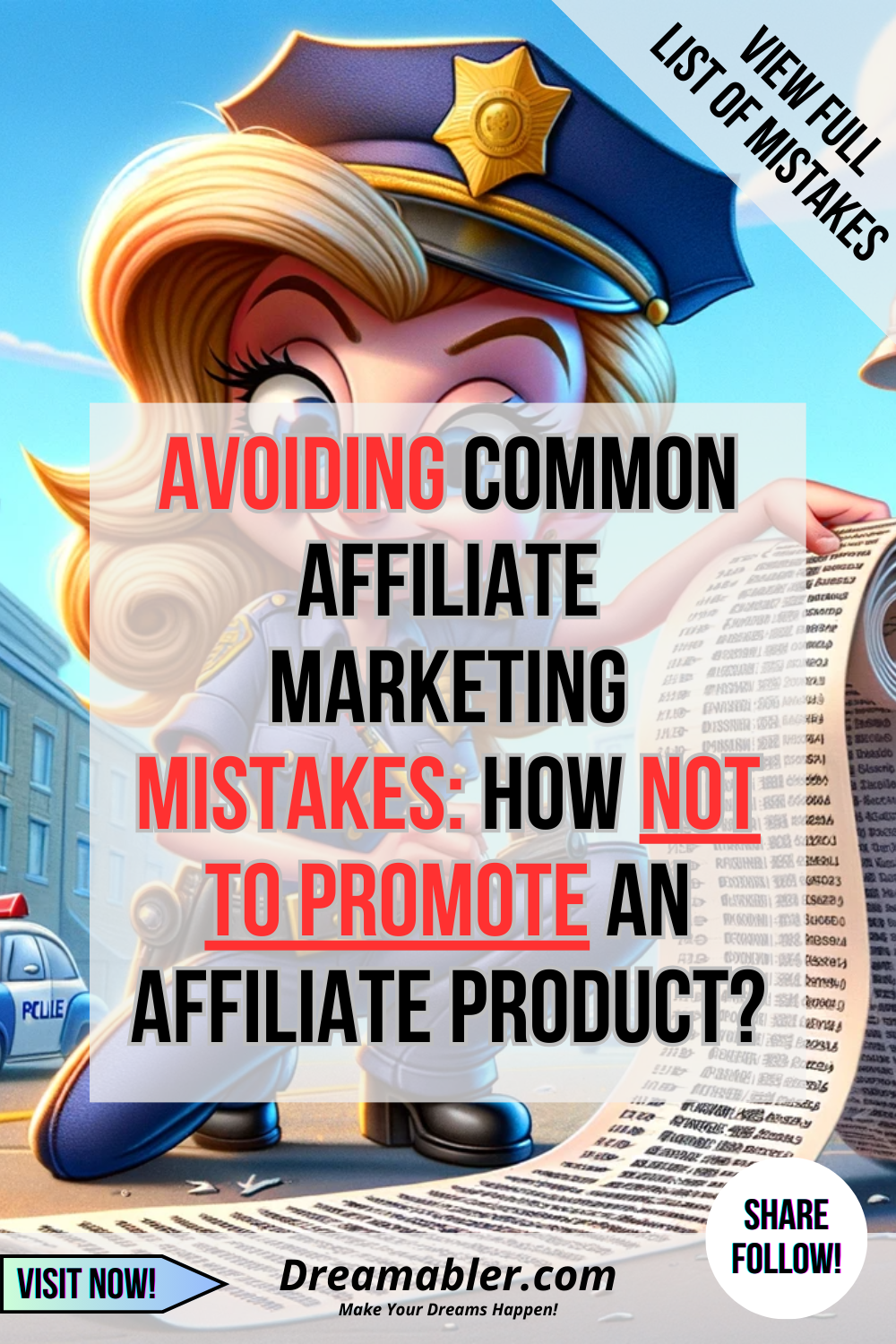Last Updated on February 12, 2024 by Mika
TL;DR: "Avoiding Common Affiliate Marketing Mistakes" outlines key errors to steer clear of in affiliate marketing, such as neglecting audience trust, over-relying on promotional content, chasing trends, and endorsing low-quality products. It provides practical tips for building trust, balancing content, and choosing products wisely to ensure long-term success in affiliate marketing.
I’m thrilled to dive into a topic that’s close to my heart and wallet – affiliate marketing. My journey in this dynamic world began years ago, and oh, what a ride it’s been!
From fashion to electronic pianos, and from iGaming to digital products, I’ve dipped my toes in a vast ocean of affiliate offers. Each experience has been a stepping stone, teaching me invaluable lessons along the way.
Now, let’s talk about why understanding and avoiding common affiliate marketing mistakes is crucial. Imagine you’re setting sail on the vast sea of affiliate marketing. Without a map or a compass, it’s easy to veer off course. That’s where I come in – consider me your affiliate marketing GPS, guiding you through the choppy waters.
I’m not just going to throw facts and figures at you. Instead, I’ll share real, actionable insights and personal experiences.
Why? Because learning from mistakes – mine and others’ – is a powerful way to steer clear of common pitfalls in affiliate marketing. There’s always something new to learn in this ever-evolving landscape!
By the end of this article, you’ll be equipped with the know-how to navigate the affiliate marketing world more confidently and effectively.
It’s not just about avoiding errors; it’s about embracing a strategy that propels you towards success. Let’s get started!
The Foundation of Trust in Affiliate Marketing
Trust and credibility are crucial for success in affiliate marketing according to Forbes. Affiliate marketing is a multibillion-dollar industry, with projections suggesting continued growth. According to Influencer Marketing Hub, it drives 15-30% of eCommerce sales, highlighting its effectiveness as a marketing strategy.
Building trust with your audience is like planting a seed in fertile soil. It requires patience, care, and the right strategies.
In my early days of affiliate marketing, I learned this the hard way. I remember promoting a high-tech gadget that was all the rage. Sure, it was a cool product, but I hadn’t used it myself. My audience sensed this lack of genuine experience, and the campaign flopped. That’s when it hit me – trust isn’t just a nice-to-have; it’s essential.
So, how do you build this trust that turns into passive income? Here are some actionable steps:
- Be Genuine: Only promote products you believe in. If you wouldn’t use it, don’t expect your audience to.
- Share Personal Experiences: If you’ve used the product, talk about it. Your real-life experience is invaluable.
- Transparency is Key: Always disclose your affiliate relationships. Honesty fosters trust.
- Provide Value Beyond Sales: Offer insights, tips, and valuable content that’s not just about selling.
Trust-building is an ongoing process. It’s about showing your audience that you’re there to offer real value, not just to make a quick buck. This approach might take longer to show results, but it’s sustainable and far more rewarding in the long run.
Learn From My Mistakes
Years ago, I learned a crucial lesson in the hard world of affiliate marketing. Eager to capitalize on every opportunity, I found myself jumping from one offer to another.
This frenetic pace led me to create hundreds of websites, each designed with a singular focus: to sell. (Yes, that was long before the AI, but it was quite an automated building method.) It was a numbers game for me; the sheer mass of my online presence meant that inevitably, some people stumbled upon my sites through Google.
The long cookie durations worked in my favor, ensuring I received commissions from these chance encounters. However, this strategy was flawed at its core. There was zero trust built with my audience.
As a result, these sites, one after another, began to fail. The lack of genuine connection and trust with my audience meant that these ventures were unsustainable. This experience was a stark reminder that in the realm of affiliate marketing, trust isn’t just an asset; it’s a necessity.
Reflecting back, I realize that ‘audience’ might be the wrong term to describe those who visited my websites. In reality, they were just passersby, digital wanderers who stumbled upon my sites through organic Google searches.
There was no real audience because there was no engagement or connection. They weren’t followers of my content or advocates of the products I promoted; they were simply visitors, briefly passing through without a reason to stay or return.
The lack of a genuine audience highlighted a fundamental flaw in my approach – the absence of a meaningful relationship with my visitors.
The key takeaway? Trust is the cornerstone of successful affiliate marketing, especially for newcomers. It’s easy to get caught up in the excitement of potential earnings, but without trust, your efforts are like a house built on sand – bound to collapse. Focus on building a solid foundation of trust, and you’ll create a loyal audience that believes in your recommendations. That’s the real secret to long-term success in affiliate marketing.
Mistake #1 – Over-Reliance on Promotional Content
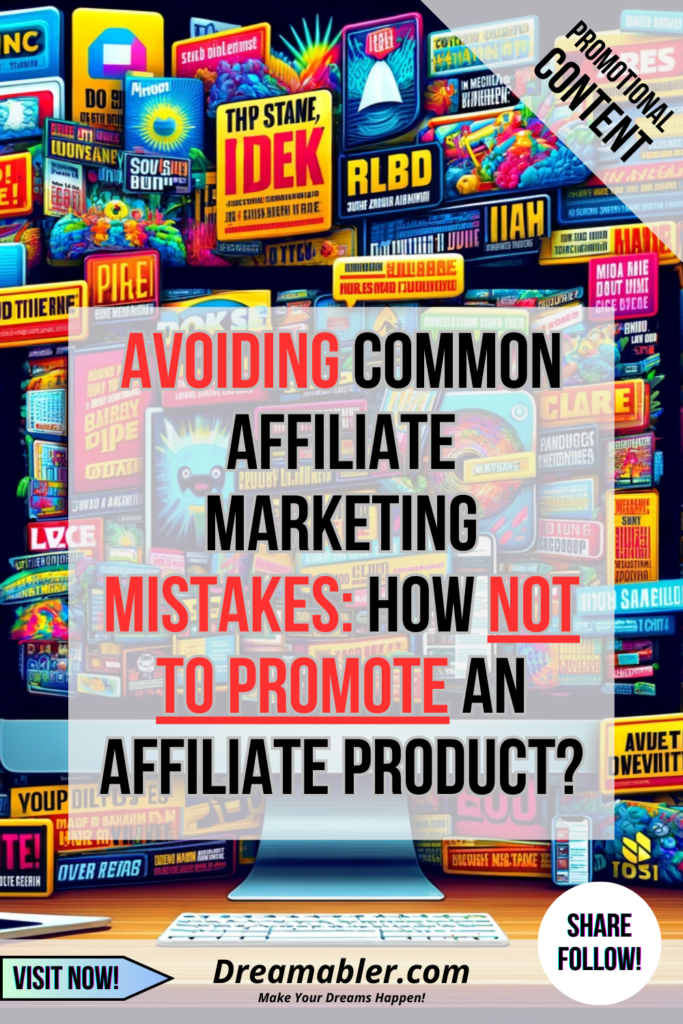
It’s easy to fall into the trap of bombarding your audience with promotional content. I learned this lesson the hard way.
In my early days, I was all about the hard sell. My emails? A relentless stream of promotions. Back then, I didn’t have any idea about the dos and don’ts of email list building.
My content? A billboard for the latest offers. It seemed effective, until I noticed my engagement rates plummeting. My audience was tuning out, overwhelmed by the constant sales pitch.
Here’s the thing: people don’t want to be sold to all the time. They crave connection, value, and engagement. When your content is a one-note symphony of sales, you miss the chance to build a relationship with your audience.
So, what’s the actionable advice here? It’s all about balance. Mix your promotional content with material that’s genuinely valuable and informative. Here are some tips to strike that balance:
- Educate Your Audience: Share insights, tips, and how-tos related to your niche. Make your content a resource, not just a sales pitch.
- Tell Stories: People love stories. Share your experiences, the challenges you’ve faced, and how the products you promote can genuinely solve problems.
- Engage and Listen: Encourage feedback. Ask questions. Create a two-way conversation with your audience.
- Provide Variety: Mix up your content. Videos, blogs, infographics – variety keeps your audience engaged and interested.
By balancing promotional content with valuable, informative material, you’ll not only avoid the pitfall of over-promotion but also build a loyal, engaged audience. Remember, in affiliate marketing, trust and value are key. Keep your audience’s needs at the forefront, and your marketing efforts will be rewarded.
Mistake #2 – Falling for Shiny-Object Syndrome
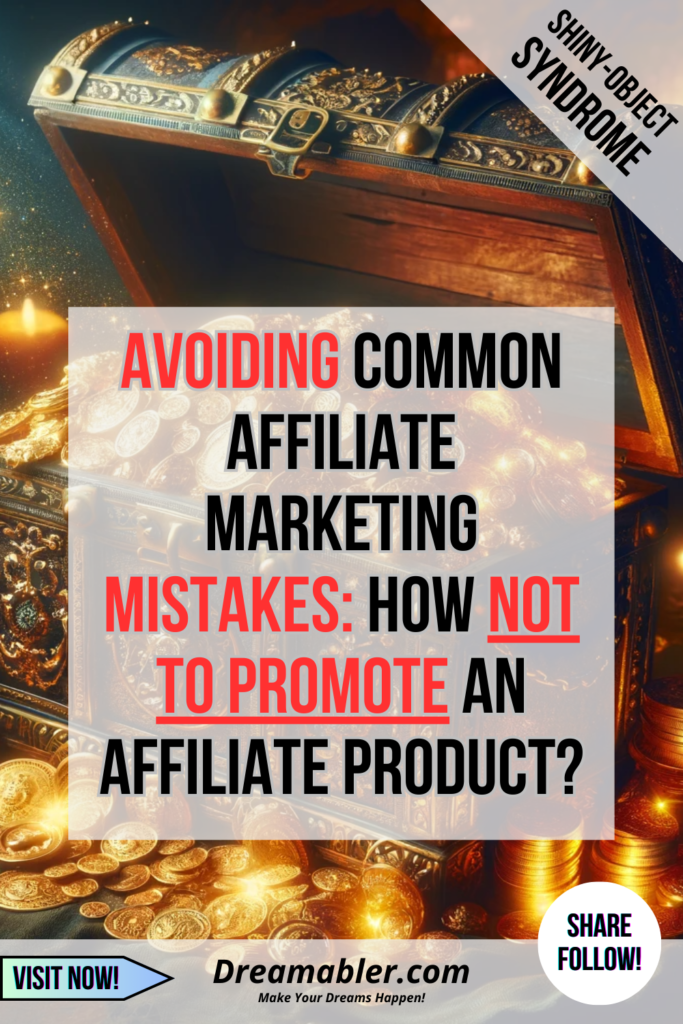
The shiny-object syndrome is like a siren’s call, tempting but perilous. It’s that all-too-familiar lure of ‘get-rich-quick’ schemes that promise the moon but deliver only stardust. I’ve been there, dazzled by the allure of easy money and instant success.
Early in my journey, I found myself hopping from one trendy product to another, each promising to be the next big thing. Spoiler alert: they weren’t.
So, how do we, as aspiring affiliate marketers, avoid this trap and stay on course? Here are some tips:
- Set Long-Term Goals: Focus on what you want to achieve in the long run, not just quick wins. Sustainable success is a marathon, not a sprint.
- Research Thoroughly: Before jumping on a product, do your homework. Is it reputable? Does it align with your values and your audience’s needs?
- Learn to Say No: Not every opportunity is worth pursuing. If it sounds too good to be true, it probably is.
- Build a Solid Foundation: Invest time in building your skills, understanding your audience, and creating quality content. These are your real assets.
Remember, in affiliate marketing, patience and persistence are your best allies. The shiny-object syndrome might look appealing, but it’s a detour on the road to genuine success. Stick to your path, and you’ll build an affiliate marketing career that’s not just profitable, but also fulfilling and sustainable.
Mistake #3 – Promoting Low-Quality or Irrelevant Products
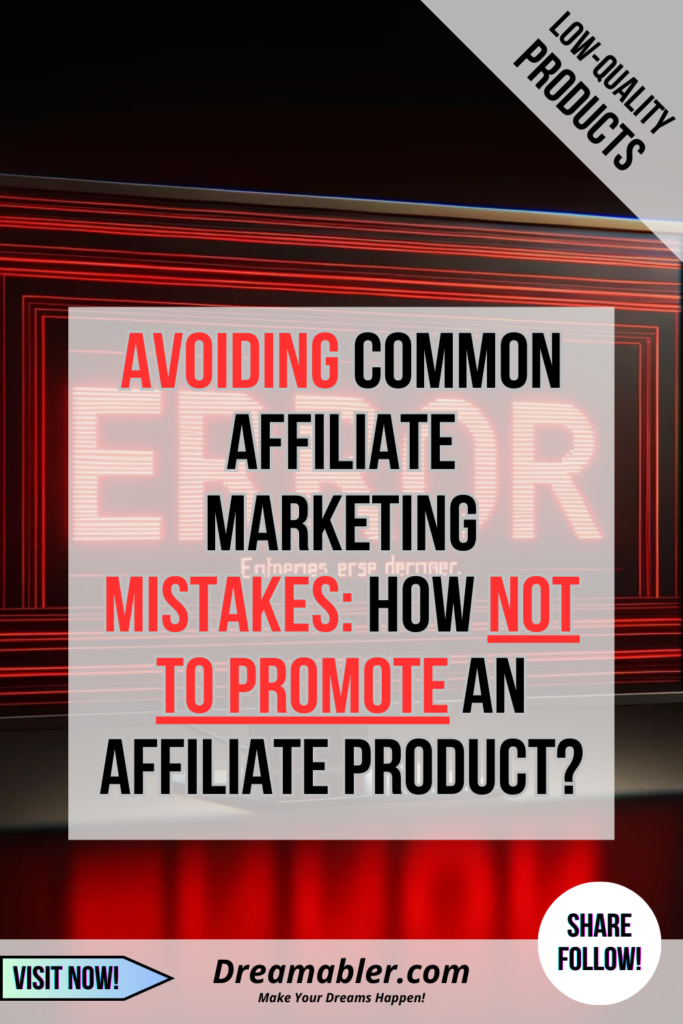
One of the cardinal sins in affiliate marketing is promoting products that don’t resonate with your audience or, worse, are of low quality.
I learned this lesson in a rather memorable way. Once, in an attempt to jump on a trending product, I promoted a gadget that seemed like a perfect fit for my tech-savvy audience.
However, it turned out to be a dud – poorly made and not as useful as advertised. The backlash was immediate. My audience’s trust, which took ages to build, was shaken. It was a stark reminder that short-term gains are no match for long-term trust.
So, how do you ensure you’re aligning with the right products? Here’s some advice:
- Understand Your Audience: Know their interests, needs, and pain points. What would genuinely help or delight them?
- Quality Over Quantity: It’s better to promote fewer products with proven quality than a slew of subpar items.
- Test Before You Endorse: If possible, use the product yourself. Can you honestly vouch for its quality and usefulness?
- Stay Relevant: Ensure the products are aligned with your niche. Irrelevant products confuse your audience and dilute your brand.
A Few Not-So-Kind Words About Crap Internet Marketing Products

As I underlined earlier, always steer clear from endorsing products that lack real value. I mean products that are essentially futile, serving only to entice purchases without offering any substantial benefit.
The net is rife with creators of such products, many of whom flock to platforms like JVZoo and Warrior Plus. A critical issue with these platforms is their apparent lack of rigorous product quality checks. Anyone can sell there quite much whatever they want.
It’s not an overstatement to say that a significant portion, perhaps around 70%, of the products available on these platforms are substandard, designed more as traps for unsuspecting buyers than as valuable offerings.
My own experience back to my early days in internet marketing is a testament to this. I’ve previously been enticed by products boasting instant traffic and easy money with just a click, only to realize they were nothing but elaborate ruses to lure in buyers.
I did recently a visit on both platforms going through offers, and it seems that nothing has changed, but they are now even more popular and there’s even more crap out there.
These products often lead you down a rabbit hole of continuous upsells and upgrades, each as disappointing as the last – unless you are a complete newbie – amazed by the “knowledge” the creator boasts or “magic buttons” the software has.
Remember, your subscribers and prospects have placed their trust in you, believing in your ability to offer solutions, not to lead them astray with empty promises. Your role is to guide them towards genuine value, not to the hollow allure of these deceptive products.
Selecting the right products is more than just a business decision; it’s about maintaining integrity and trust with your audience. When you recommend a product, you’re putting your stamp of approval on it. Make sure it’s something you’re proud to stand behind. Remember, in the long run, the quality and relevance of the products you promote will play a significant role in your success as an affiliate marketer.
Mistake #4 – Ignoring the Power of Authentic Storytelling
Authentic storytelling is a thread that many marketers overlook. Yet, it’s a powerful tool that can weave a deeper connection with your audience. I learned the true value of storytelling in one of my campaigns.
I was promoting a fitness app that I personally found transformative. Instead of the usual product features rundown, I shared my fitness journey – the struggles, the setbacks, and how this app helped me overcome them. The response was phenomenal. Engagement soared, and so did conversions. My story resonated with my audience, making the product more relatable and desirable.
So, how can you harness the power of storytelling in your affiliate marketing? Here are some tips:
- Be Genuine: Share real experiences. Authenticity in storytelling creates a bond of trust with your audience.
- Connect Emotionally: Good stories evoke emotions. Make your audience feel something – inspired, relieved, understood.
- Show, Don’t Just Tell: Use vivid descriptions, personal anecdotes, and relatable scenarios to bring your story to life.
- Make It Relevant: Your story should tie back to the product in a way that feels natural, not forced.
Incorporating storytelling into your affiliate marketing isn’t just about selling a product; it’s about sharing an experience that your audience can connect with. It’s a powerful strategy that can set you apart in a crowded digital space. Remember, people may forget what you said, but they will never forget how you made them feel. Use storytelling to make your affiliate marketing efforts more impactful and memorable.
Mistake #5 – Neglecting Analytics and Feedback
Overlooking the insights provided by analytics and feedback is like sailing a ship without a compass. Analytics play a crucial role in shaping and refining affiliate marketing strategies.
I learned the importance of this tool during one of my campaigns. Initially, the campaign was performing moderately, but something felt off. Diving into the analytics, I noticed that most of my traffic was coming from a demographic I hadn’t targeted specifically.
This revelation was a game-changer. I tweaked my campaign to cater to this audience, and the results were astounding – better engagement and higher conversions.
Here’s how you can effectively use analytics and feedback in your affiliate marketing:
- Monitor Performance Regularly: Use analytics tools to track the performance of your campaigns. Look for patterns, trends, and anomalies.
- Understand Your Audience: Analytics can reveal a lot about your audience – their preferences, behavior, and how they interact with your content.
- Test and Tweak: Use the data to test different approaches. Adjust your strategies based on what the numbers tell you.
- Listen to Feedback: Pay attention to what your audience is saying. Their feedback is invaluable in understanding what works and what doesn’t.
Incorporating analytics and feedback into your strategy is not just about numbers; it’s about gaining insights that can drive smarter decisions. These tools offer a window into the effectiveness of your efforts and provide a roadmap for improvement. Remember, in affiliate marketing, knowledge is power. The more you know about your campaigns and your audience, the better you can tailor your strategies for success.
Mistake #6 – Underestimating the Importance of Consistent Branding
A common oversight in affiliate marketing is neglecting the power of consistent branding. Early in my career, I made the mistake of promoting products that were all over the map in terms of relevance and brand alignment.
This approach confused my audience and diluted my brand identity. I was promoting everything from kitchen gadgets to tech gear without a clear, cohesive theme.
The turning point came when I decided to focus on products that aligned with my brand and values. This shift not only clarified my message but also attracted a more engaged and loyal audience.
Here’s how you can avoid this mistake:
- Define Your Brand: Understand what your brand stands for. What are your values, interests, and the unique perspective you bring to your niche?
- Align Products with Your Brand: Choose products that resonate with your brand’s ethos. This consistency helps in building a loyal following.
- Communicate Your Brand Clearly: Use your platforms to reinforce your brand’s message and values. Let your audience know what you stand for.
- Be Selective: It’s tempting to promote every product with a good commission, but restraint is key. A well-curated selection that aligns with your brand is more effective than a scattergun approach.
Remember, your brand is your promise to your audience. It’s what sets you apart in the crowded affiliate marketing space. By maintaining consistent branding, you not only enhance your credibility but also create a stronger, more memorable presence. This approach ensures that your audience knows what to expect from you, fostering trust and loyalty in the long run.
More Mistakes To Avoid
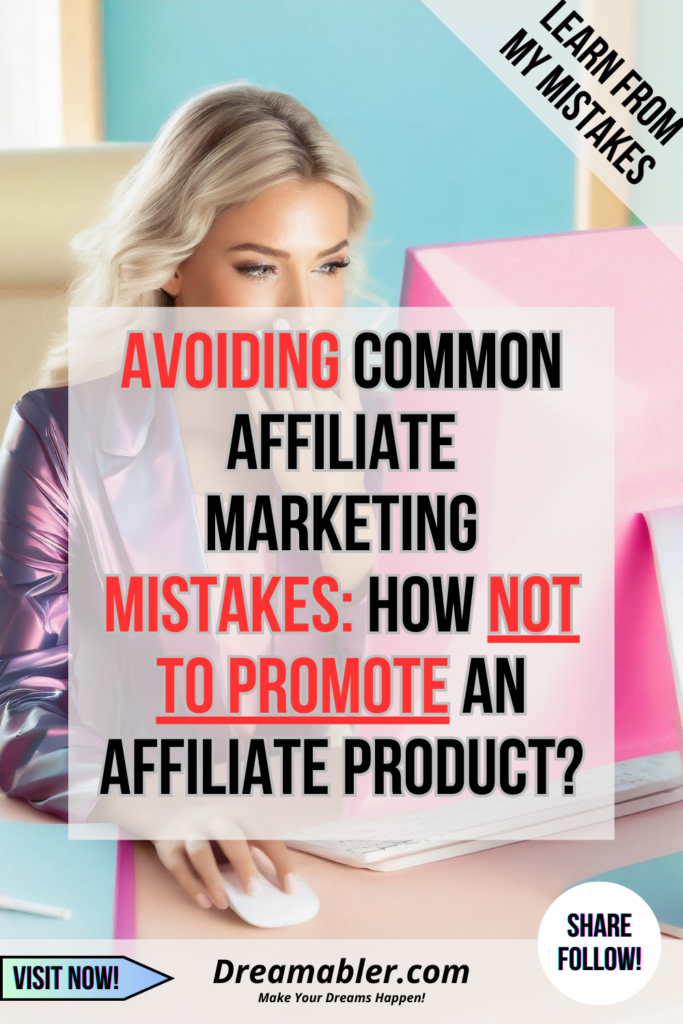
While we’ve already discussed some key mistakes to avoid, the landscape is vast, and there are several other missteps that can hinder your journey. To help you navigate this terrain more effectively, here’s a comprehensive list of additional affiliate marketing mistakes to keep in mind.
These points will further equip you with the knowledge to steer clear of common errors and optimize your strategy for better results, so let’s explore these additional mistakes to avoid in your affiliate marketing endeavors.
- Ignoring SEO Practices: Not optimizing content for search engines can lead to poor visibility and low traffic.
- Overlooking Mobile Optimization: Failing to ensure that affiliate sites are mobile-friendly, which can alienate a large portion of the audience.
- Neglecting Email List Building: Underestimating the power of a well-cultivated email list for direct and effective communication.
- Skipping Market Research: Not researching the target market thoroughly can lead to misaligned product promotions.
- Inconsistent Posting: Lack of a regular posting schedule can lead to reduced audience engagement and interest.
- Not Diversifying Affiliate Networks: Relying on a single affiliate network or program limits potential income sources.
- Ignoring Legal Requirements: Not adhering to legal requirements like FTC guidelines for disclosure can lead to serious consequences.
- Failing to Track Affiliate Links: Not tracking the performance of affiliate links can result in missed opportunities for optimization.
- Overlooking Content Quality: Compromising on content quality for the sake of quantity can harm credibility and audience trust.
- Not Engaging with Your Audience: Failing to interact with your audience can lead to a lack of community and engagement.
- Using Intrusive Advertising: Implementing overly aggressive or intrusive advertising tactics can annoy and drive away potential customers.
- Not Updating Content: Failing to keep content up-to-date can lead to misinformation and reduced search engine rankings.
- Ignoring Competitor Strategies: Not keeping an eye on competitors’ strategies can result in missed opportunities and insights.
- Relying Solely on Affiliate Marketing: Not diversifying income streams and relying solely on affiliate marketing can be risky.
- Not Personalizing Affiliate Messages: Failing to tailor affiliate messages to different segments of your audience can reduce effectiveness.
- Skipping A/B Testing: Not conducting A/B tests on affiliate strategies can lead to suboptimal performance.
- Overlooking User Experience: Ignoring the overall user experience on your site can deter visitors from engaging with your content.
- Not Leveraging Social Media Effectively: Failing to use social media platforms to promote affiliate products can limit reach.
- Ignoring Data Privacy Concerns: Not respecting audience data privacy can lead to trust issues and legal complications.
- Lack of Patience and Persistence: Giving up too soon due to unrealistic expectations of quick success in affiliate marketing.
Quotes About Affiliate Marketing Mistakes

Affiliate Marketing Mishaps: From Rookie Blunders to Pro Insights (and Everything in Between)
Been there, done that, bought the (wrong) affiliate T-shirt? We all have. But hey, those stumbles are stepping stones to success! Dive into these quotes packed with hard-won lessons from seasoned affiliates. Discover common pitfalls to avoid and insider tips to boost your game. The road to affiliate riches is paved with learning – and sometimes, a healthy dose of laughter at our past selves.
So, buckle up, marketing mavericks, and prepare to laugh, learn, and level up your affiliate marketing skills.
“Shiny Object Syndrome”
I saw a high-commission product and jumped in blind, promoting it everywhere. Turns out, it was low-quality junk. My audience lost trust, and my reputation took a hit. Now, I research thoroughly before recommending anything.
Andrea
“The Spray and Pray”
I blasted generic affiliate links across social media, hoping something would stick. Crickets. Now I tailor my content to specific audience needs, using organic recommendations and targeted placements.
Tina
“The Content Vacuum”
I churned out thin, keyword-stuffed blog posts to get clicks. Google ignored me, and readers felt misled. Now I focus on valuable, in-depth content that genuinely helps my audience, building trust and organic reach.
Markus
“The Invisible Disclosures”
I buried affiliate disclosures in fine print, hoping nobody would notice. Big mistake. Transparency is key. Now I use clear, upfront disclosures, respecting my audience and avoiding legal trouble.
Kalle
“The Data Desert”
I ignored analytics, flying blind on what worked and what didn’t. Wasted time and effort. Now I track everything, analyzing data to optimize campaigns and maximize results.
Pia
“The Solo Act”
I went it alone, reinventing the wheel. Turns out, collaboration is powerful. Now I connect with other affiliates, learning from their experiences and leveraging shared resources.
Jackson
“The Get Rich Quick Mirage”
I chased unrealistic expectations, burning out fast. Affiliate marketing is a marathon, not a sprint. Now I set achievable goals, focusing on steady growth and long-term success.
Khan
“Mega Blaster”
I promoted everything under the sun, thinking variety was key. Turns out, my audience felt scattered and confused. Now, I focus on a niche I truly know and love, building trust and authenticity.
Richardo
“Too Trendy”
I chased quick trends, forgetting the power of evergreen content. Now, I create valuable resources with lasting appeal, attracting steady traffic and commissions.
Fatima
“Email Is Dead”
I neglected building an email list, leaving money on the table. Now, I nurture my audience with valuable newsletters, keeping them engaged and driving repeat sales.
Ana
P.S. Don’t keep your own affiliate marketing mishaps (and triumphs!) to yourself! Share your experiences in the comments below or send them directly to me using the contact form. Let’s build a community of affiliate all-stars, where shared knowledge paves the way to everyone’s success!
Ready To Rock As An Affiliate Marketer?
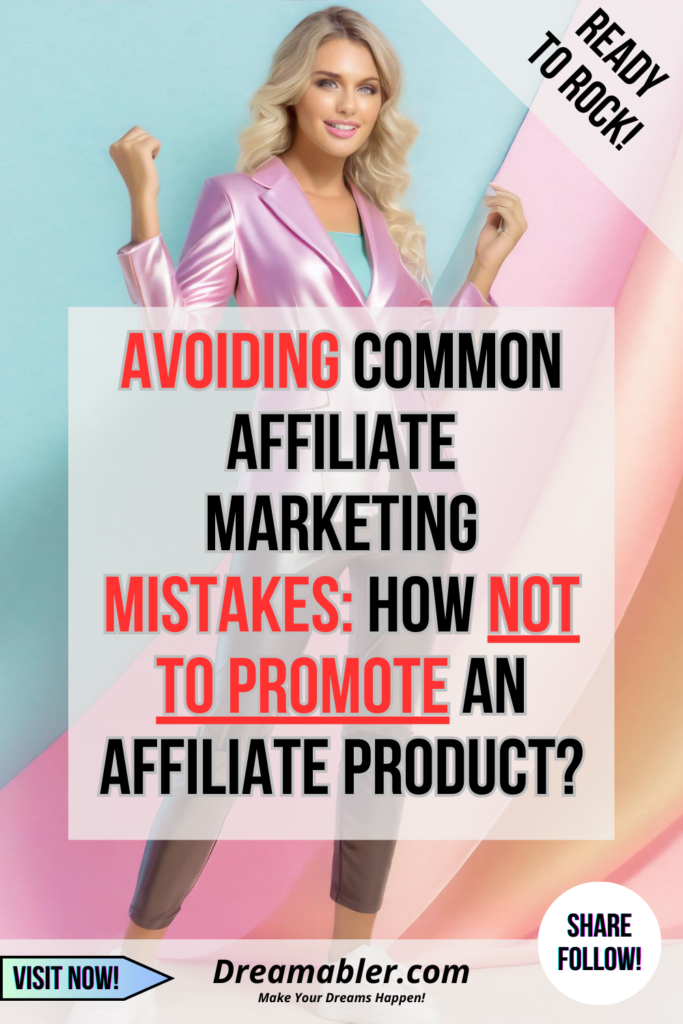
We’ve uncovered a multitude of pitfalls that can derail even the most enthusiastic marketer. From the foundational importance of building trust with your audience to the nuanced art of storytelling, each point we’ve discussed plays a crucial role in shaping a successful affiliate marketing strategy.
We’ve also highlighted the significance of analytics, the perils of ignoring SEO, the necessity of mobile optimization, and the value of engaging with your audience, among many other key aspects.
Each mistake is a learning opportunity, a stepping stone towards growth in the ever-evolving realm of affiliate marketing. Embracing these lessons not only enhances your strategy but also deepens your understanding of this dynamic field.
I encourage you to view these insights not as deterrents but as beacons guiding you towards a more informed and effective approach.
I’d love to hear about your experiences and any additional insights you may have. Your stories and questions enrich our collective journey in affiliate marketing.
Also, consider subscribing to my newsletter for more tips and personal stories from my affiliate marketing journey and the exciting world of blogging.
Let’s continue to learn, grow, and succeed together in this fascinating journey. Here’s to making our affiliate marketing dreams a reality!
Avoiding Affiliate Marketing Blunders: Top 5 FAQs Answered
⭐️ What are the biggest mistakes people make in affiliate marketing?
- Promoting the wrong products: Choose products relevant to your audience and that you genuinely believe in. Don’t push anything just for a commission.
- Neglecting content quality: Focus on informative, engaging content that adds value for your audience, not just sales pitches.
- Skipping disclosure: Always disclose affiliate links clearly and transparently. Building trust is key.
- Ignoring tracking and analytics: Monitor your performance to see what’s working and adapt your strategy.
- Forgetting about building relationships: Focus on nurturing an engaged audience, not just chasing quick conversions.
⭐️ How can I avoid promoting irrelevant products?
- Stay true to your niche: Promote products related to your content and audience’s interests.
- Do your research: Test and use the products yourself if possible. Authenticity sells.
- Prioritize value: Think about what benefits the product offers to your audience.
⭐️ What’s the best way to disclose affiliate links?
Be clear and upfront: Use terms like “affiliate link” or “sponsored content.” Explain the benefit for your audience: “I might earn a commission if you purchase through this link.” Keep it natural: Integrate disclosure seamlessly into your content without being disruptive.
⭐️ How important are tracking and analytics in affiliate marketing?
Crucial! Track clicks, conversions, and earnings to understand what’s working and optimize your efforts. Use tools offered by affiliate programs or analytics platforms like Google Analytics. A/B test different approaches to see what drives the best results.
⭐️ How can I build strong relationships with my audience?
- Engage with them: Respond to comments, answer questions, and participate in discussions.
- Be transparent and genuine: Share your personality and values, not just promotional messages.
- Offer value beyond affiliate marketing: Provide informative content, tips, and resources relevant to their interests.

